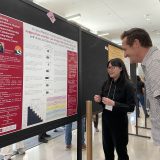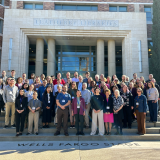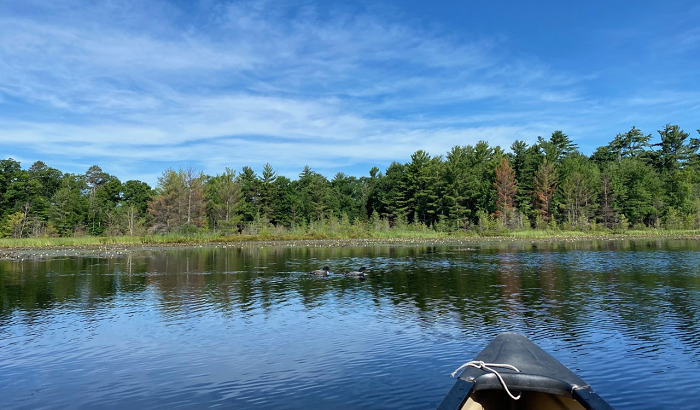
A Summer in Wisconsin Observing Animal Behavior Student Research Spotlight: Annie Ng '21 shares her experience with the Loon Project
September 7, 2020
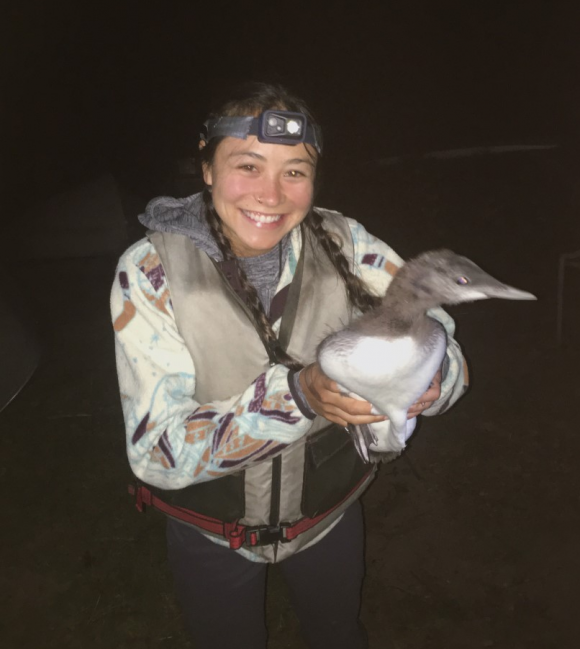 As summer comes to an end, we’re excited to showcase our students who completed research and internships over the past few months! Senior environmental science and policy major Annie Ng talked with us about her summer research experience with the Loon Project, a research project headed by Professor of Biological Sciences Dr. Walter Piper.
As summer comes to an end, we’re excited to showcase our students who completed research and internships over the past few months! Senior environmental science and policy major Annie Ng talked with us about her summer research experience with the Loon Project, a research project headed by Professor of Biological Sciences Dr. Walter Piper.
Q&A with Annie Ng:
Schmid College: Tell us about your research experience this summer!
Annie Ng: I was an undergraduate field researcher, working under Dr. Walter Piper (a biology faculty at Chapman). I was working out there from late May until early August. The study area included more than 100 lakes located in Northern Wisconsin (specifically Oneida County, Lincoln County, and Vilas County). During my time there, I observed the loons on five lakes per day for the majority of the time, then switched to capturing the loons and their chicks for the last 10 days of work. During the observation time (around the first 1.5 months) I independently paddled and collected the loons’ identification bands, data on their reproductive status (checking on nests and chick information), and recorded their territorial behavior (when intruder loons visited different lakes). When we moved to capture, I held the adult and chick loons while Dr. Piper collected data and attached identification bands on the unbanded loons. I was taught how to properly hold loons, in order to keep both the humans and the loons safe.
SC: Why did you choose to work on the Loon Project?
AN: I chose to work on the Loon Project because I’ve always been interested in fieldwork with animals. I took a class with Dr. Piper during the spring semester, where he mentioned his research he conducted during the summers. I did not know what a loon was before taking his class, so I did some research on my own and became interested in this characteristic diving bird. Dr. Piper and I met mid-spring and he told me that the research included observing the animals’ behavior, paddling on lakes, and being in nature all summer. I was extremely impressed with all the information I found on the Loon Project blog (loonproject.org) and couldn’t turn down the opportunity.
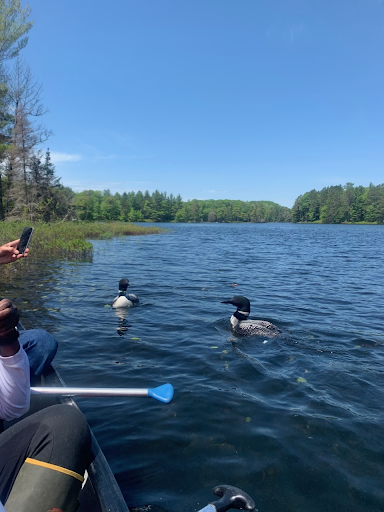 SC: Did COVID-19 impact or change the project at all?
SC: Did COVID-19 impact or change the project at all?
AN: COVID-19 forced us to shift the schedule back. Our team was late to survey and check on the lakes in the study area. Usually, a few members of the team are able to go out earlier in the spring to check which lakes have Loon pairs. Since the team was out later than previous years (due to COVID-19), we spent more time surveying and checking the status of lakes (sometimes not seeing pairs). Usually, the team would jump right into visiting 5 lakes a day, gathering reproductive, identification, and territorial behavior on lakes where we for sure know there are loons.
SC: How did Schmid and the environmental science program prepare you for this research opportunity?
AN: Schmid and ES&P [environmental science and policy] prepared me for this research opportunity by creating a solid network and support system. Before this summer, I had worked with the Funk Lab and got guidance from Dr. Jennifer Funk. Dr. Jason Keller was also a good resource to chat about different summer opportunities. Being a transfer student, it was important to find a community within Schmid, and ES&P has provided that.
SC: How does research relate to your field of study/career goals?
AN: I am concentrating on ecology within the ES&P major, so I’ve been interested in the biology side of Environmental Science. I want to work in the field of animal behavior in the future, so this experience observing loon behavior allowed me to explore that further.
SC: What was your biggest takeaway from this experience?
AN: My biggest takeaway from this experience is being able to be in the field. I love being outdoors and I love learning about the way the world around me functions. This project gave me more confidence and reassurance that I do indeed want to conduct and involve myself in fieldwork. There is something so special about being surrounded by nature and observing plants and animals in their habitat as an outsider aka “human”.
SC: What advice would you give to other students looking to become involved in research?
AN: My advice is to just put yourself out there. I know that sounds cliche, but talk to your professors and create meaningful connections. If your professor talks about their research in classes, they are usually so excited to talk more about it during office hours. If your professor’s specific research interests are not exactly what you want to do in the long run, it is still worth it to gain that experience anyways or ask if they have resources for people in your interest field. I think it is important to take those opportunities because even if you end up disliking the work, it will point you in the right direction of what to do next!
Interested in research and internships? Chapman’s Career and Professional Development team can help you find internships, and the Center for Undergraduate Excellence can connect you with research opportunities at Chapman!
